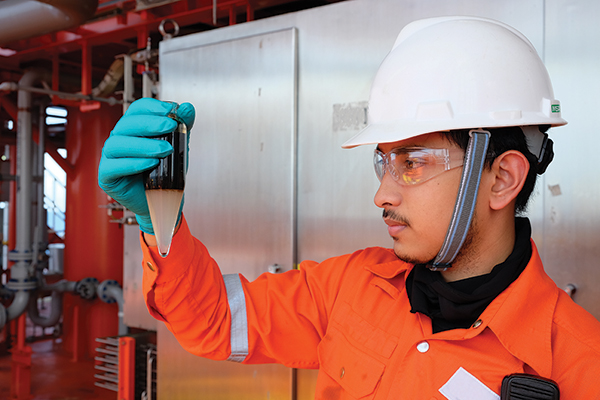“The Great Resignation” has been all over the news in recent months, and most organizations—including those in the lubricants industry—have felt deeply the effects of the historic shortage of qualified candidates. While there has been some debate as to whether people are merely quitting their jobs or if those already close to retirement are simply choosing to retire early, in any case there has been a mass exodus from the workforce. This phenomenon has forced many companies to scramble to retain current talent as well as to find new talent to fill open positions.
Add the Great Resignation to the shortage of skilled labor that has been in the works for several years and this can put organizations involved in reliability maintenance in a real conundrum. The questions plaguing business leaders of the past are quite different in the present. Many are asking, “What is the best and most effective way to retain a talented workforce, and how can companies bring new employees up to the skill level required to complete the important tasks at hand?”
While often overlooked, one answer to these questions is for companies to invest some of their resources in high-quality employee training.
Many companies offer only quick, on-the-job training by an industry veteran who teaches the new crop of employees the day-to-day job and then leaves it at that, dropping the newbies into an environment that they may not be completely prepared to handle. When training is looked at from that rather rushed perspective, so many of the benefits of investing in employee training can be lost.
Fortunately, more formal and thorough employee training options are available and can be valuable to a company in many ways.
One of the things that employees consistently list as an important aspect of any job is “feeling valued by their employer.” Investing in training is an effective way to make an employee feel that they are appreciated by their company. That is to say that adequately training your employees can help them feel as if the company cares about developing the skills they need to do and be their best. Investing in improving their skills can also demonstrate that the company believes in them and opens up the possibility that new skills may lead to upward movement (i.e. a promotion).
Money is always a factor in employee satisfaction, too. So even if the money a company spends on its employees does not come in the form of a bonus or a raise, spending money on an employee’s training proves that they are valued all the same. This sort of investment allows organizations to not only improve skills but also to improve morale. After all, satisfied employees increase employee retention.
|
Investing in training is an effective way to make an employee feel that they are appreciated by their company.
|
On another hand, one of the main goals companies are constantly striving for is greater productivity. The simplest ways to accomplish it are through decreased downtime and improved machine reliability. The goal of predictive maintenance is to reduce that downtime to an absolute minimum. This means that scheduled downtime for repairs that are not necessarily needed can be eliminated, and sudden catastrophic failure that can significantly extend downtime can be circumnavigated.
So what is the best solution? Having a maintenance staff that is fully trained in predictive maintenance is certainly part of it.
What Are the Lube Industry’s Training Options?
There are multiple options when it comes to predictive maintenance training. One of the more effective options is oil analysis. Even within the practice, there are multiple options for training based on the level of existing or desired knowledge.
There are two main certification bodies for oil analysis: ICML (International Council for Machinery Lubrication) and STLE (Society of Tribologists and Lubrication Engineers). Both organizations offer different levels of certification. Beginner-level ICML certifications include MLT-I and MLA-I. As for STLE, the entry-level certification is OMA-I.
ICML’s MLT-I (Machinery Lubrication Technician) and MLA-I (Machine Lubricant Analyst), while both entry-level certifications, have some overlap but also a few key differences. Both cover in depth maintenance strategies, lubrication theories, lubricant selections, lubricant applications as well as lubricant storage and management. Topics covered in the ICML MLT-I course specifically include lubricants, preventative and predictive maintenance, and a stronger focus on lubricant application. The MLA-I consists of such course-specific topics as oil sampling, lubricant health monitoring and wear debris analysis.
STLE’s OMA-I certification is most closely related to the ICML MLA-I certification.

Most classes that offer preparation for any of the three certifications will last two days. However, because of the overlap between certifications, a three-day class will often be offered that provides the attendee with information needed to tackle all entry-level certification exams.
Beyond the entry-level certifications, there are more advanced certification offerings from both ICML and STLE. ICML includes a level two version of both their MLA and MLT certifications. STLE has a level two of their OMA certification and also their Certified Lubrication Specialist, or CLS, certification. These certifications may require at least three years of prior experience within the lubrication field.
The more advanced certifications, of course, go into more depth on many of the same topics that the beginner-level courses cover, with areas such as problem solving, lubricant manufacturing and lubricant formulation. The attainment of these higher-level certifications demonstrates true mastery of lubrication.
While obtaining a certification is both impressive and allows those that achieve it to add that designation to their title, the primary value of oil analysis classes is to increase knowledge, capabilities, employee value and retention.
The Changing Classroom
Until recently, the training format had stayed relatively constant, with an instructor teaching at the front of a classroom. The COVID-19 pandemic necessitated new technologies that are starting to change and improve the way that trainings are conducted.
In addition to webinar-based training, another newer technology is asynchronous web-based learning. This type of instruction allows people to learn at their own pace. The early versions of asynchronous learning often lacked the engaging aspect of in-person learning, but rapidly increasing technology is now encouraging greater engagement. One of the newer technologies being explored in the asynchronous learning environment is virtual reality. Commonly referred to as VR, virtual reality creates an immersive experience that is virtually hands-on but still offers the experience in a controlled and safe environment.
In-person, instructor-led training will never fully disappear, as it certainly is still effective in many situations. Rather it will be balanced with new technology, including anything that improves how training is delivered to trainees.
In addition to public training classes, some training providers offer private training either virtually or on the job site. This is a viable option for organizations that want to reduce the cost—one flat fee regardless of the number of attendees. It may also appeal to companies that cannot spare employees for an entire one- or two-day period, because private training can be tailored to length. Additionally, this type of training can accommodate scheduling conflicts, as these classes can be scheduled to adjust to the organization’s schedule. Importantly, private training is a good option for companies that need training tailored for their specific needs.
|
The bottom line is that there is no downside to reliability training. It has been proven to offer many benefits to employees, from feeling valued to increasing job mobility within the organization.
|
The bottom line is that there is no downside to reliability training. It has been proven to offer many benefits to employees, from feeling valued to increasing job mobility within the organization. It is mutually beneficial to the corporation as well, because it can result in reduced machinery downtime, increased productivity and improved employee retention.
Lubricant Industry Certification Options
ICML Certifications
• Level I Machine Lubricant Analyst is for anyone in the field of lubricant analysis-based machinery condition monitoring. It requires one year of experience and 16 hours of training. Exam topics include Lubrication Theory/Fundamentals, Lubricant Selection, Lubrication Application, Lube Storage and Management, Lube Condition Control, Oil Sampling, Lubricant Health Monitoring, Maintenance Strategies, and Wear Debris Monitoring and Analysis.
• Level II Machine Lubricant Analyst is for the lubricant analysis-based machinery condition monitoring field. It requires two years of experience and 24 hours of training. Exam topics include Lubricant Roles and Functions, Oil Analysis Maintenance Strategies, Oil Sampling, Lubricant Health Monitoring, Lubricant Contamination Measurement and Control, and Wear Debris Monitoring and Analysis.
• Level I Machine Lubricant Technician is for fields that include machinery lubrication, engineering, mechanical maintenance or maintenance trades. It requires two years of experience and 16 hours of training. Exam topics include Maintenance Strategy, Lubrication Theory, Lubricants, Lubricant Selection, Lubricant Application, Preventive and Predictive Maintenance, Lube Condition Control, and Lube Storage and Management.
• Level II Machine Lubricant Technician is for fields that include machinery lubrication, engineering, mechanical maintenance or maintenance trades. It requires three years of experience and 32 hours of training. Exam topics include Maintenance Strategy, Lubrication Theory, Lubricant Formulation, Grease Application and Performance, Lubricant Selection, Lubricant Testing and Performance Analysis, Lubricant Application, Preventive and Predictive Maintenance, Lube Condition Control, and Lube Storage and Management.
STLE Certifications
• Certified Lubrication Specialist is for anyone that could be designated a “lubrication engineer” by their employer. This includes people from a variety of backgrounds, including sales and management. It requires three years of experience. Exam topics include Lubrication Fundamentals; Fluid Conditioning, Storage, Handling and Application of Lubricants; Monitoring and Reducing Consumption of Lubricants; Gears; Bearings; Seals; Fluid Power; Lubricant Manufacturing; Pneumatics; Transportation Lubricants Metalworking; Solvents and Cleaners; Problem Solving; Lubricant Analysis, and Lubrication Programs.
• Oil Monitoring Analyst I is for predictive maintenance professionals who oversee the oil analysis program for a shop or plant. These employees are generally mechanics, engineers, operators, tradesmen, chemical managers or on-site lab personnel. It requires one year of experience and 16 hours of training. Exam topics include Lubrication Fundamentals, Sampling, Application/Test Methods, Data Interpretation, and Troubleshooting.
• Oil Monitoring Analyst II is for professionals working at the supervisory level. These include reliability engineers, lubrication engineers, tribologists, maintenance supervisors, or onsite or commercial lab management. It requires one year of experience and 16 hours of training. Exam topics include Lubricant Selection, System Configuration, Sampling and Analytical Methods, Sampling Intervals, Suppliers, Program Logistics, Training, Baseline Data, Limits and Alarms, Test Validation, Data Interpretation, Actions, Maintenance, Analysis, Quality, Safety, Documentation, Failure Analysis, Tribological Factors Affecting Design, and Program Management.
Tim Skully is the training unit business manager for Eurofins TestOil. Skully has over a decade of experience developing, implementing and improving learning and development programs. At Eurofins TestOil, Skully organizes public and private training classes, while evaluating programs toward continuous improvement that will better serve the reliability maintenance community.
